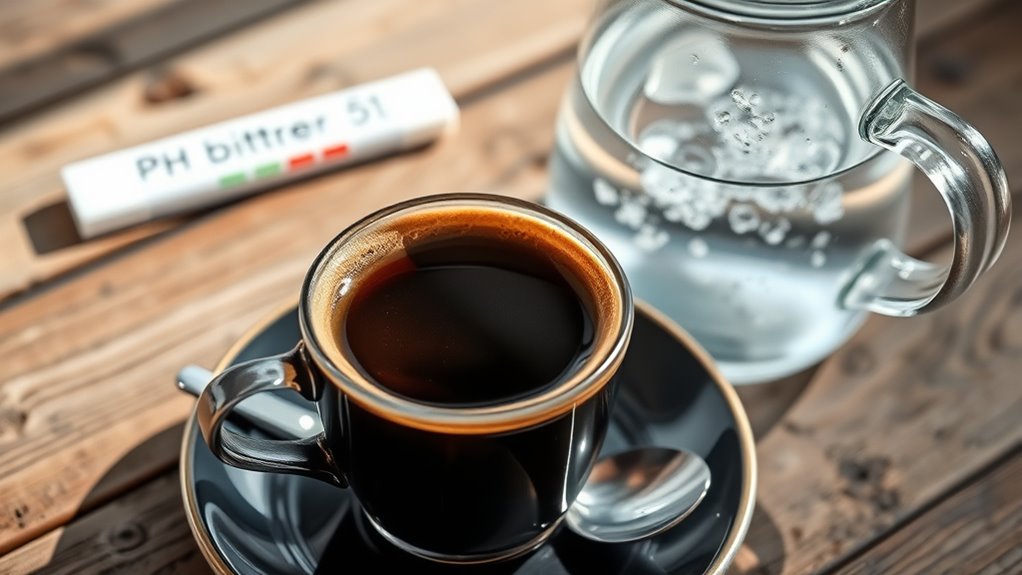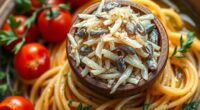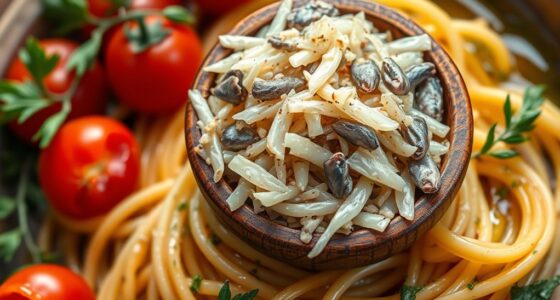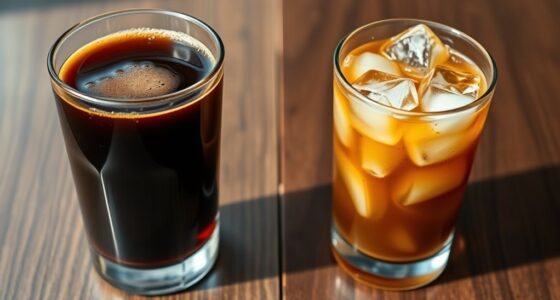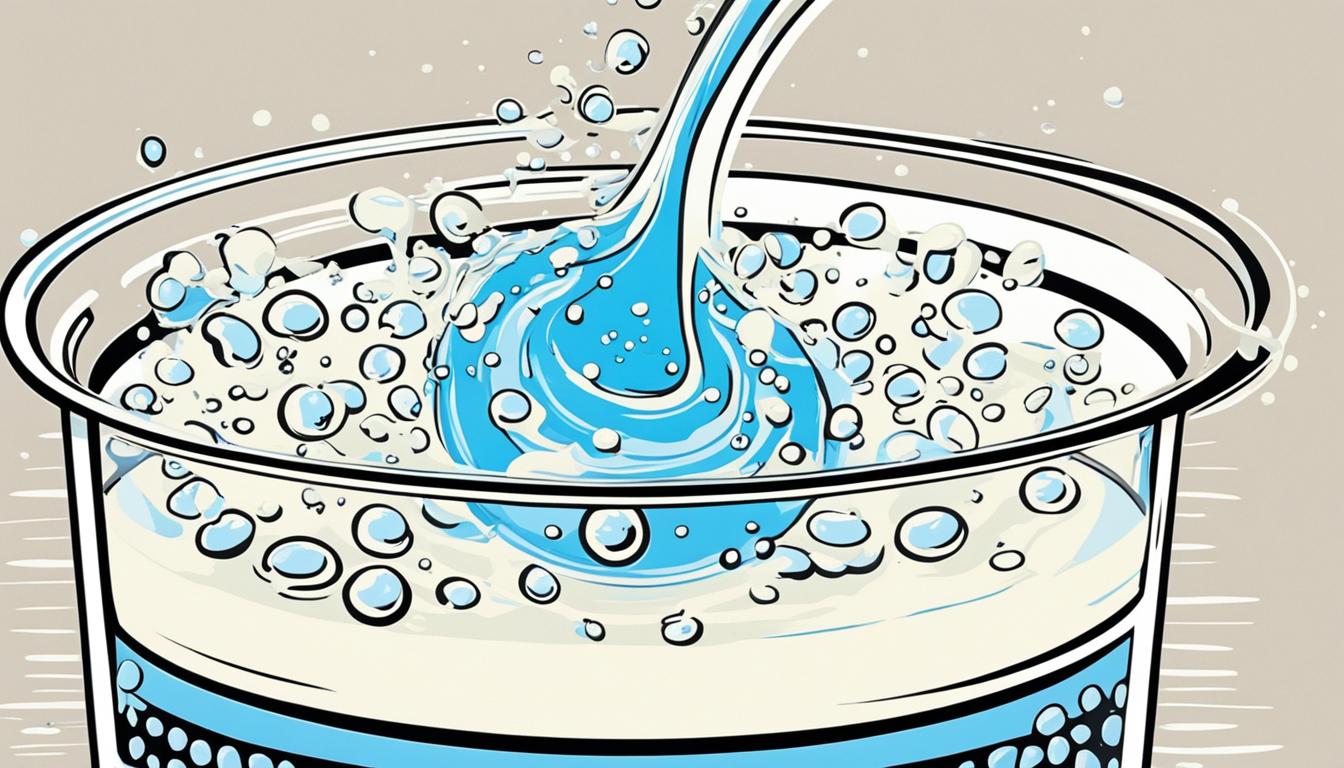Your coffee tastes bitter mainly because of over-extraction, which happens when water interacts too long or extracts too many bitter compounds from the grounds. Using water with high mineral content or poor chemistry can also increase bitterness. Adjusting brewing time, grind size, and pouring speed can help, but controlling water chemistry makes a big difference. If you keep these factors in mind, you’ll find ways to improve your brew and avoid unwanted bitterness. Keep exploring to learn how water balance can transform your coffee.
Key Takeaways
- Over-extraction from brewing too long, fine grind, or slow pouring introduces bitter compounds, making coffee taste bitter.
- Dark roasts are more prone to bitterness if over-extracted due to concentrated flavor compounds.
- Water that is too hard can increase extraction and bitterness, while softer water produces a smoother, less bitter cup.
- Proper brewing techniques and grind size help prevent over-extraction and reduce bitterness in coffee.
- Adjusting water chemistry balances extraction, enhances flavor, and minimizes unwanted bitterness in your coffee.

Have you ever wondered why your coffee sometimes tastes bitter even when you didn’t add extra sugar? The answer often lies in the process of coffee extraction and the roasting levels. Coffee extraction is the key to revealing the flavors locked inside each bean, but if it’s not done correctly, it can lead to bitterness. When hot water interacts with coffee grounds, it pulls out flavors and compounds. If this extraction is too aggressive—say, over-extraction—you end up pulling out bitter-tasting compounds along with the desirable ones. Over-extraction can happen when you brew too long, use too fine a grind, or pour water too slowly. On the flip side, under-extraction leaves you with sour or weak coffee because not enough of those flavorful compounds have been released. Striking the right balance during extraction is essential, and understanding your roast levels plays a significant role here.
Roasting levels influence the flavor profile of your coffee and how it responds during extraction. Light roasts retain more of the original bean’s characteristics, often leading to brighter, more acidic flavors. Dark roasts, however, develop richer, bolder flavors with more caramelized sugars and reduced acidity. But be careful—darker roasts tend to be more prone to bitterness if over-extracted because their flavor compounds are more concentrated and can quickly turn bitter. Conversely, lighter roasts might taste more delicate and nuanced, but they can also become sour or under-extracted if not brewed properly. Knowing your roast level helps you tailor your brewing method. For example, a light roast might require a slightly longer extraction time to bring out its subtleties, while a dark roast might need a shorter brew to prevent bitterness.
Understanding coffee extraction and roasting levels gives you the tools to troubleshoot bitterness. If your coffee tastes bitter, consider adjusting your brewing parameters—such as grind size, brewing time, and water temperature—to optimize extraction. Additionally, water chemistry plays an essential role—hard water can enhance extraction but also heighten bitterness, while softer water might produce a cleaner, smoother cup. By controlling these variables, you’ll better manage how your coffee’s flavors develop, reducing unwanted bitterness. Proper water chemistry can make a significant difference in balancing flavor and extraction. Remember, the goal isn’t just about brewing strong coffee but achieving a balanced, flavorful cup that highlights the beans’ inherent qualities. With a little knowledge about extraction and roasting levels, plus some tweaks to your water chemistry, you can enjoy richer, smoother coffee every time.
Frequently Asked Questions
Can Water Hardness Affect Coffee Bitterness?
Yes, water hardness can affect coffee bitterness. When your water has high mineral content, it influences the brewing pH, often making it more alkaline. This alters extraction, resulting in a bitter taste. Using softer water with balanced mineral levels helps maintain ideal brewing pH, ensuring your coffee tastes smoother and more balanced. Adjusting water hardness is a simple way to improve flavor and reduce unwanted bitterness in your brew.
Does Brewing Temperature Influence Bitterness?
Ah, the grand quest for the perfect brew—so delicate, yet so easily ruined. You’ll find that brewing temperature dramatically impacts bitterness, as it influences extraction timing and the roast’s richness. Too hot, and you’ll release bitter compounds; too cool, and you miss the full flavor. Adjusting temperature precisely allows the delicate balance of flavors to emerge, making your coffee taste just right, regardless of roasting level.
How Does Grind Size Impact Bitterness?
You might notice that grind size impacts bitterness because inconsistent grind consistency leads to uneven extraction. Larger particles extract more slowly, while finer ones release flavors quickly, which can cause bitterness. When your grind has uniform particle size, extraction is balanced, reducing the chance of over-extraction and bitterness. So, paying attention to your grind size and ensuring consistent particle size helps you brew smoother, less bitter coffee.
Are Certain Coffee Beans More Prone to Bitterness?
You might notice some beans taste more bitter than others, and that’s often due to their origin and roasting level. Beans from certain regions, like darker roasts, tend to develop stronger, more bitter flavors. Lighter roasts preserve the beans’ natural sweetness, reducing bitterness. So, if you prefer a smoother cup, choose beans from specific origins and opt for a lighter roast; it makes a big difference.
Can Storage Methods Alter Coffee’S Bitterness?
Storage methods definitely impact coffee’s bitterness by affecting storage degradation and freshness preservation. If you store coffee improperly—like exposing it to air, heat, or moisture—you accelerate degradation, making it taste more bitter over time. To preserve freshness and reduce bitterness, keep your coffee in an airtight container, away from light and heat. This way, you maintain flavor quality longer and enjoy a smoother, less bitter cup every time.
Conclusion
Remember, you are what you brew. By understanding how water chemistry affects your coffee’s bitterness, you can adjust your water to improve flavor. Don’t be afraid to experiment with different mineral levels until you find what works best for you. After all, a good cup of coffee is worth the effort. As the saying goes, “A little water goes a long way.” Keep tweaking, and you’ll enjoy a smoother, richer brew every time.

